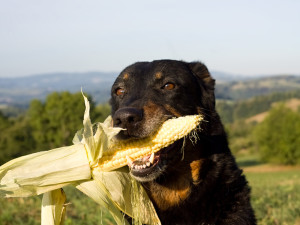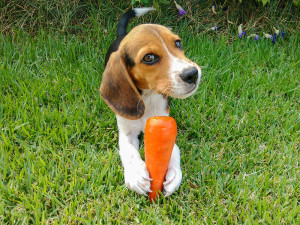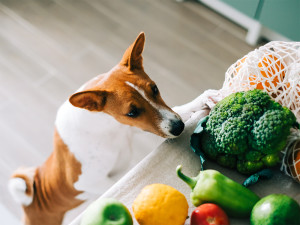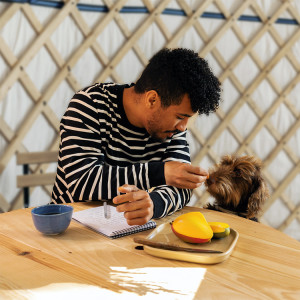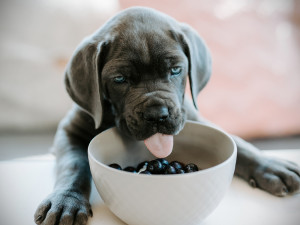Can Dogs Eat Ham?
That might be what you’re having for the holidays, but read here to see if your dog can partake.

Share Article
This holiday season, you might be tempted to spread the cheer with your pup by giving them a little nibble of your holiday ham. And why shouldn’t you? Even the Grinch cut Max a slice of “roast beast” after he helped save Christmas. Well, we can’t speak for the nutritional value of roast beast but we do know a thing or two about ham. The fact is, ham is non-toxic for dogs but pup parents should still refrain from sharing it with their dogs.
“Ham tends to be high in sodium and fat so it is not good for dogs. High-fat foods can cause digestive upset and pancreatitis,” veterinarian Dr. Amy Fox says.

littleKin™ is Kinship’s home just for puppy and kitten parents. Bop over to check out expert advice, new pet tools, and special deals—all curated for your newest family member.
opens in a new tabIn addition, certain spices and dressings that hams are commonly prepared with can be a no-go for your pup. “If you have lean, low-sodium ham that does not contain spices or sauces, a small bite-sized taste can be OK,” Dr. Fox adds. For more on how to safely ham it up with your pup this holiday season, read more below.
Is ham good for dogs?
Ham, while delicious, has no nutritional value for dogs. Like most meat, ham is rich in protein, a large nutritional building block of your dog’s diet. However, dogs require lean meats as part of a healthy diet.
Can dogs have ham bones?
“Bones are a definite no,” Dr. Fox stresses. “In addition to being a choking hazard, bones can splinter and break, especially once cooked, causing injuries as dogs try to chew and swallow them. They can also cause intestinal blockages and bone impactions further down in the digestive tract.”
This applies to any and all bones you might be cooking this holiday season. As a general rule of thumb, if a bone isn’t sold specifically for pets, it's best to keep it away from your pup.
Is ham completely safe for dogs?
While non-toxic, ham is not completely safe for dogs. In general, ham is a fatty meat and fatty meats can cause gastrointestinal distress and pancreatitis in dogs. Furthermore, dogs with underlying health conditions, especially issues like heart disease, should never be given high fatty foods such as ham.
What are other dog safe foods you might find on your holiday table?
Carrots: Plain carrotsopens in a new tab are a healthy and nutritious snack for dogs. However, since most carrots are served salted and seasoned, maybe slip your dog a plain one during meal prep.
Cooked sweet potato: Sweet potatoopens in a new tab is considered a “superfood” for both humans and dogs thanks to its digestive properties. However, dogs should definitely enjoy this superfood as plainly as possible and in moderation. Similar to the carrots, if you plan to season your sweet potatoes, consider setting a plain one off to the side for your dog when cooking.
Apple: Apples are a sweet treatopens in a new tab your dog can enjoy safely — once the seeds and the core are removed. Not to sound like a broken record, but moderation is also key when it comes to apples and your dog. Similarly, avoid sharing your apple pie. While cooked apples aren’t toxic to pups, the sugar and fat in apple pie is likely to upset their stomach.
What are other non-dog safe foods you might find on your holiday table?
Garlic and onions: Though not usually served by themselves, garlic and onionsopens in a new tab are usually involved somewhere in the process of making holiday food delicious. However, garlic and onions are toxic to your dog—particularly onions. Avoid giving your dog any foods cooked or seasoned with garlic or onions.
Grapes and raisins: Sometimes used in stuffing, raisins pose a very big riskopens in a new tab to dogs. Even small traces of grapes or raisins can cause kidney failure in dogs. Besides stuffing, avoid serving raisins and grapes in dishes that dogs can easily reach (such as a pre-dinner charcuterie board perched on a coffee table) and do not offer dogs foods that were cooked with raisins or grapes even if they have been removed.
Pecans and walnuts: Common pie fillings, such as walnuts and pecans, are both very toxic to dogs. Both nuts contain juglone, which can cause vomiting and GI distress. Unlike raisins and grapes, one or two dropped nuts are not likely to harm your dog, though you should monitor them after any amount of consumption. If your pup gets into a bag of nuts or a pie, however, make sure to get veterinary attention as soon as possible.
High-fat-content foods: The holidays are a time when humans indulge in some delicious and rich dishes, but that doesn’t mean your dog should. Fatty foods, such as buttery veggies or dark meat turkey, can cause GI upset or even pancreatitis in your pup. Always make sure even “non-toxic” human foods are served plain without butter, seasoning, or tons of salt.
Bottom line: Can dogs eat human food?
Most of the time human food is best reserved for, well, humans — especially foods prepared with spices and sauces, like those commonly found at holiday celebrations. And while ham isn’t toxic to dogs, it’s best to avoid sharing the fatty meat with your pup. Especially if your dog has stomach sensitivities or dietary restrictions, fatty meats like ham can lead to issues such as pancreatitis opens in a new tabor other gastrointestinal distress.
And, in the grand scheme of things, human food should never make up more than 10 percent of your dog’s diet and is best reserved for a special occasion. During the holidays, if you do want to treat your dog to a protein-rich human food, opt for leaner meats such as boneless, plain chicken or turkey.

Rebecca Caplan
Rebecca Caplan is a writer based in Brooklyn whose work has been featured in The New Yorker, Reductress, and Vulture. She lives in Brooklyn with her perfect, toothless dog Moose.
Related articles
- opens in a new tab
Can Dogs Eat Mango?
The delicious fruit is safe in moderation.
![Curious Basenji dog puppy climbs on the table with fresh vegetables at home in the kitchen.]() opens in a new tab
opens in a new tabCan Dogs Eat Broccoli?
Find out how to safely get your pup their greens.
- opens in a new tab
Can Dogs Eat Shrimp?
Is your pup a seafood fan? Find out everything you need to know about feeding them shrimp.
![a dog by biscuits and a Christmas tree]() opens in a new tab
opens in a new tabThe Holidays Are Prime Time for Pancreatitis—Here’s How to Protect Your Dog
With all the festivities (and eating!) afoot, it’s extra important to know how to prevent the disease.
![Various Veggie Chips in a Ceramic Blue Bowl]() opens in a new tab
opens in a new tabCan Dogs Eat Sweet Potatoes?
Add it to the list of healthy human superfoods pups can eat, too.
![Puppy eating a bowl of blueberries]() opens in a new tab
opens in a new tab10 Superfoods You Should Share With Your New Dog
From kale to quinoa, these nutrient-packed picks deserve a spot in your dog’s food bowl.
